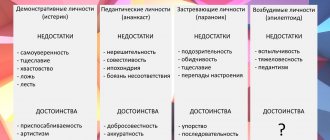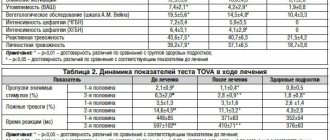Continuing the topic of personality typology, let me remind you that accentuation is a pronounced character trait that does not go beyond the norm of deviations in human psychology and behavior. Accentuation manifests itself to the greatest extent in certain unfavorable life circumstances for a person. This influences a person’s behavior and attitude towards others.
In the previous article, I described the classification of A. E. Lichko and mentioned that it is consonant with the classification of K. Leonhard, a German scientist and psychiatrist, they seem to complement each other. I will dwell on it in more detail.
What are character accentuations?
accentuation is , you first need to analyze the meaning of the word “ character ”. Typically, the term “character” is understood by psychologists as a set of stable personality traits that leave an imprint on behavior, relationships with people and oneself. Character is reflected in the entire life activity of an individual, the choice of contacts, giving behavior an individual shade . Character accentuation is the personality traits that are most expressed in a person. Scientists all over the world are studying accentuation due to the fact that when a character trait is excessively manifested, it is possible to create conditions favorable for the formation of mental disorders. To find accentuations, Leongard created a questionnaire that determines an individual’s accentuations.
The presence of certain accentuations does not mean going beyond the limits of normality , but sometimes it can become a factor that interferes with the normal construction of interpersonal relationships.
Each type of accentuation has “ weak points” that are most susceptible to injury under the influence of negative factors. Repeated trauma of this kind leads to deviant behavior.
The role of accentuations in personality structure
In the personal structure, accentuations occupy a leading role and largely determine the quality of life of an individual.
It is worth considering that accentuation is not a diagnosis! In a psychologically mature person, it manifests itself as a feature, which can be a clue in choosing a place of study, profession, or hobby.
If accentuation takes on pronounced forms (this depends on many factors - upbringing, environment, stress, illness), then it is necessary to use drug treatment. In some cases, certain types of character accentuation can lead to the formation of neuroses and psychosomatic diseases (for example, a labile type often suffers from infectious diseases), and in extreme cases, such a person can be dangerous.
Types of character accentuation according to K. Leonhard
The author identifies three groups of character accentuation, differing in origin.
- as character (socially determined education);
- temperament (natural formation) included hyperthymic, dysthymic, cycloid, exalted, anxious and emotive types;
- At the personal level there were two types – extra- and introverted.
Types of accentuations
Types of temperament and character accentuation according to Leonard are divided into separate groups.
Temperament
The scientist attributed six types of accentuations to temperament, as a biologically determined formation. Let's talk briefly about each of them.
- Hyperthymic (hypomanic) temperament. Characterized by a predominance of an optimistic mood, a thirst for activity, a focus on success, and sociability. Negativity develops superficiality, an inability to complete a task. There is a violation of ethical standards, a waste of opportunities.
- Dysthymic type (subdepressive). The opposite of hyperthymic. Characterized by an orientation toward failure, pessimism, a serious ethical position, extreme passivity in action, and lethargy.
- Affectively labile type (cyclomic). It is characterized by frequent changes in hyperthymic and dysthymic states.
- Anxious. Characterized by the inability to defend one's point of view in a dispute, fearfulness, timidity, wariness, humility, and a humiliated position. Compensation in the form of feigned self-confidence or even impudent behavior is possible.
- The affectively-exalted type is distinguished by the intensity of experiences, violent emotional reactions, and a tendency to extreme manifestations of feelings (enthusiasm, despair). Easily charged by the mood of others.
- The emotive type is characterized by the ability to deeply feel and empathize. He is distinguished by his impressionability, kindness, and compassion.
Character
Leonhard's character classification is represented by four types.
- Demonstrative (hysterical) type. The peculiarity of accentuation is the hypertrophied tendency to repression. This explains the ability of the hysteric to embellish reality. A person, as it were, enters into the desired image, beginning to believe his fantasies. Thanks to this trait, he easily adapts to his environment, instilling in himself a feeling of love and sympathy for others. The notorious “need for recognition,” as one of the motives of the demonstrative type, is exaggerated. Rather, the passion for self-praise is associated with the ability to repress objective information about oneself. For an ordinary person, if he wants to embellish the real state of things, the brakes are turned on. A hysteric person tends to forget himself, which often leads to rash actions.
- Pedantic character. In contrast to the demonstrative type, the repression mechanism is poorly developed. People with this type of personality are not able to repress doubts or discard unimportant details of the issue, so they can hardly make their choice on any decision. Hence indecision, scrupulousness in work, hypochondria.
- Stuck type. Characterized by the persistence of affective reactions. A penchant for ideas that completely take over a person’s thinking. Stuck affect is most clearly manifested in the case when a person’s personal interests are affected. Affect in these cases turns out to be a response to wounded pride, as well as to various forms of suppression, although objectively the moral damage may be negligible. As a result, the stuck type develops such traits as suspicion, hostility, jealousy, and morbid ambition.
- Excitable type (epileptoid). Characterized by following lower instinctive impulses and ignoring the voice of reason. As a result, impulsiveness, incontinence, demandingness, intolerance, hot temper, and conflict develop.
Extroversion/introversion
Character types according to Leonhard also include extroverted and introverted personality accentuations.
Due to the fact that most psychologists rely on the interpretation of terms according to Eysenck, and psychiatrists - according to Leonhard, such terminological discrepancy creates a problem in finding a common language between specialists.
According to Leonhard, the extroverted personality type is a conformist who does not subject to special analysis information coming from the outside, and therefore easily succumbs to the influence of others. An introvert, on the other hand, does not blindly succumb to the sensations of the present moment, focusing primarily on previous life experiences and his own conclusions. Here, Leonhard’s opinion coincides with the point of view of Carl Jung, who attributed to introverts the traits of thinking types, and to extroverts - ethical (experiencing) types.
Demonstrative type
A characteristic feature of this accentuation is demonstrative behavior , emotional liveliness, and artistry . Such people have a craving for fantasizing , lying and pretense, usually this is not due to the presence of malicious intent, they like to embellish their own personality in the eyes of others. They strive to be the center of attention and love praise and attention . This type of accentuation is characterized by rapid adaptation to new conditions and emotional mobility. They are inconsistent in their actions, one day they will confirm and agree with your point of view, and on the next they will completely sincerely say the opposite opinion.
Hyperthymic character
Character accentuations according to Leonhard also include the “hyperthymic” type. A hyperthymic person is always inspired. Brilliant ideas and Napoleonic plans are born in his head every five minutes. He loves to tell all his acquaintances about them, and these stories inspire him even more, but he rarely fulfills his promises for one simple reason: firstly, a hyperthymic person, like Julius Caesar, loves to do 10 things at the same time, and secondly, it’s fast for him His activities become boring, and he again looks for a new niche for activity. Nevertheless, it is interesting to be with such a person; due to his broad interests in life, he is able to carry on a conversation on any topic and give worthwhile advice completely free of charge or offer an interesting way out of a crisis situation.
Pedantic type
These people try to think through all possible options for action and behavior, so they cannot make an exact decision for a long time. Before doing something, they want to be completely sure that this is the best way out of a problem situation. Pedants take everything in life seriously , this can be both work issues and everyday issues. People around them may perceive this character trait with dissatisfaction and consider them boring and boring. They are distinguished by excellent perseverance ; they always bring what they plan to completion . People of the pedantic type are not ready for radical changes in their lives; they have difficulty surviving traumatic events, which can make them indecisive. They do not like to participate in conflicts and try by all means to avoid them.
Hysterical type
Hysteroids are distinguished by a high need for attention to themselves and egocentrism. Demonstrative, artistic
They do not like it when someone else pays attention to them or praises others. There is a high need for admiration from others
Teenagers of the hysterical type strive to occupy an exceptional position among their peers, attract attention to themselves, and influence others. They often become the initiators of various events. At the same time, hysterics are unable to organize those around them, cannot become an informal leader, or earn authority among their peers.
Stuck type
Personalities of this type of accentuation are characterized by a long-term influence of affects , short-term strong experiences. They tend to get stuck on certain thoughts and feelings. Most often this is self-esteem, hurt pride, injured pride. the boundaries of social justice for themselves , deciding what is “good” and “bad”; if the real situation does not correspond to the ideal one, they suffer. cannot forget grievances over a long period of time and are prone to conflict situations with people who once offended them. They have a clear division of people into friends and enemies; even with a slight offense, they can classify the offender into the second category. Often vindictive and suspicious. They don’t let go of the grudge, and I constantly think that they were treated unfairly . They often show jealousy. When achieving a goal, they show persistence , thanks to this they make strict demands on themselves and others. They are not used to listening to advice; they have their own opinion on any issue.
Stuck (paranoid) individuals
With pronounced accentuation, this type is called paranoid. Its basis is the stability of affect (a state of strong arousal). That is, a paranoid person gets “stuck” on his feelings, thoughts, and so on. A stuck person can be in a state of passion for a long time and any reminder of what happened brings them back to their initial emotions.
From the above, a characteristic feature of stuck individuals follows: vindictiveness and rancor. Paranoid people are also sensitive and touchy. Therefore, having identified such a character in your interlocutor, do not touch his pride and honor.
If successful, stuck individuals may become arrogant and self-confident. Like hysterics, paranoids are seen as vain people. Stuck individuals often become suspicious when society prevents them from realizing selfish goals.
Karl Leonhard noticed that in a stuck person, in the case of constant attacks from the outside, hatred towards the offender increases and at the same time, the affect that was discussed at the beginning is weakened, i.e. the personality is “tempered.”
What is interesting about stuck individuals is that they are equally likely to become both “bad” and “good” citizens. The pole in which paranoids will be depends on their own development and the influence of society on them. So, if an ambitious person achieves significant results and stands out from others, then the development of such a character follows a positive path. If a paranoid person does not play according to the rules of society, then against such a person, the latter may rebel, as a result of which suspicion may develop.
Since stuck individuals have a weak ability to repress, they need to gain real recognition in order to be proud of themselves. This is how ambition appears, which can be a driving force.
Excitable type
They are characterized by increased impulsiveness , low control of their own desires and inclinations, which are often led. Uncontrollable during violent emotional reactions .
Instinctiveness is characteristic : they do not take into account the voice of reason and sanity, they are subject to momentary desires and desires, without thinking about the consequences.
They often show irritability and intolerance towards their surroundings and cannot tolerate criticism . To people with this accentuation, study and work seem neither fun nor attractive. They usually do not set long-term and difficult-to-achieve goals and live in the present . It is difficult for them to get along in a team due to frequent conflicts. During them, they may show inappropriate emotional reactions, react violently and spend a long time sorting things out.
Affectively exalted personalities
The name, despite its pronounced accentuation, is not exactly given by Karl Leonhard in his work. “The affectively exalted temperament, when it approaches psychopathy in severity,” writes Dr. Leongard, “could be called the temperament of anxiety and happiness.” Exaltation is enthusiasm, inspiration, excitement.
Affectively exalted individuals react very violently to any situation. They easily move into an enthusiastic state from a joyful event and into despair from sad situations. At first I wanted to write that this type is too sensitive, but I did not find Karl Leonhard using this definition to address affectively exalted individuals. This definition will be used to describe emotive personalities, which will be discussed further.
Activities in which it is necessary to reveal creative potential can captivate an exalted personality. Pity for people, extreme impressionability - this also characterizes this temperament. Alarmists can be classified as exalted individuals.
Karl Leonhard believes that in order to write poetry and other artistic activities, it is necessary to be able to give in to a high intensity of emotional experiences. Without people with an affectively exalted temperament, we would probably be left without many representatives of the creative professions.
Hyperthymic type
They are cheerful , cheerful and energetic. They attract others with their inexhaustible optimism , generosity and responsiveness . They take on leading positions and love big companies. It is easy to find a common language with them; they are distinguished by pronounced gestures and pronounced facial expressions . Hyperthyms always want to do something ; they do not tend to spend time passively. They find it difficult to endure monotonous activities and strict discipline. They can’t complete a task, if it becomes uninteresting , they quit halfway.
Hyperthymic
It is considered perhaps the most dynamic character accentuation in terms of the intensity of the nervous system. People with hyperthymia are sociable and have increased sociability. These are typical extroverts who can find a common language with almost anyone and easily make friends.
Characterized by a group of features:
- Elevated mood. Constantly elevated background. Which generally explains the name of this character accentuation. The emotional component is characterized by high stability. It is difficult to upset such accentuators.
- Sociability. Increased tendency to communicate. In difficult cases, when hyperthymia is pronounced, sociability reaches the point of intrusiveness and even talkativeness. Patients are encouraged to work with this aspect of their personality. Because they can be an obstacle to establishing personal relationships and/or professional growth and development.
- Frivolity reaching the point of absurdity. In the mildest cases there is a minimal problem. When expressed, it carries danger. For example, such a patient is quite capable of wasting his salary on gambling and does not see anything wrong with this.
- Inability to complete a task. A quick change of interests, as an integral part of that same frivolity.
- Communication skills. The ability to make friends and partners. A useful trait for people involved in entrepreneurship and business. Therefore, representatives of this class can be found among professional “dealers”.
- Intolerance of monotony and monotony. What determines professional preferences. For example, such people practically do not engage in scientific activities, since it requires constant concentration. However, they feel great in places where they constantly need to work with others and communicate. For example, in the role of a manager, etc.
- Propensity to take increased risks. Including a passion for gambling, a tendency to risk your life. For example, the latter can manifest itself in extreme sports.
Positivity and sociability are clearly positive traits of hyperthymia. As for the disadvantages of hyperthymia, it is frivolity, a tendency to take unjustified risks. In the middle “position”, if the accentuation is slightly expressed, the negative features are smoothed out.
Dysthymic type
Representatives of this type of accentuation look too serious , they are often characterized by a depressed mood . Constant negative experiences, lack of joyful feelings, anticipation of troubles limit their activity. They are characterized by a solitary lifestyle , they feel out of place in a large company, and they have few friends. They feel relaxed only in small companies with people they trust. They urgently need acceptance and understanding , love and friendship. They tend to fall into a depressed state; positive and joyful events change their mood only for a short period of time. They are often haunted by an unreasonable feeling of guilt , the future seems gloomy and foggy.
Always ready to help, reliable, conscientious . These are people you can rely on and not be afraid that secrets will be discussed.
They do the work at a slow pace , but efficiently and scrupulously.
Epileptoid type
At an early age, such children are often whiny. In the older ones, they offend the younger ones, torture animals, mock those who cannot fight back. They are characterized by power, cruelty, and pride. In the company of other children, they strive to be not just the boss, but the ruler. In the groups they control, they establish cruel, autocratic orders. However, their power rests largely on the voluntary submission of other children. They prefer conditions of strict discipline, know how to please management, take over prestigious positions that provide the opportunity to exercise power, and establish their own rules.
Cyclothymic type
Personalities of this type are characterized by wave-like changes in mood and behavior. During joyful events, they experience vivid emotions and feel a surge of activity. Some sad events turn them into inhibited and depressed, lacking initiative. These emotional states can change several times a day, depending on the energy felt. You can notice fluctuations during opposite states; during moments of recovery, they awaken a desire to communicate, self-confidence and openness. When they are depressed, they want solitude and are unsure of themselves.
Classification according to Leonard
The concept of “character accentuation” was first introduced by the German scientist Karl Leonhard, who subsequently proposed the first classification of accentuations in the middle of the last century.
Leonhard's typology includes 10 accentuations, which were subsequently divided into 3 groups; their difference is that they relate to different manifestations of personality:
- temperament
- character
- personal level
Each of these groups includes several types of accentuations:
- Temperament accentuations:
Leonhard’s classification of temperament accentuations includes 6 types:
Table 1: Leonhard classification
| Hyperthymic | The hyperthymic type is sociable, loves to be among people, and easily makes new contacts. He has pronounced gestures, lively facial expressions, and loud speech. Labile, prone to mood swings, therefore often does not fulfill his promises. Optimistic, active, proactive. Strives for something new, needs vivid experiences, varied professional activities. |
| Dysthymic | Taciturn, stays away from noisy companies. Overly serious, unsmiling, distrustful. He is critical of himself, which is why such people often suffer from low self-esteem. Pessimistic. Pedantic. The dysthymic personality is reliable in close relationships, morality is not an empty word. If they make promises, they strive to fulfill them. |
| Affectively labile (cycloid) | People have moods that change several times a day. Periods of active activity are replaced by complete powerlessness. The affect-labile type is a person of “extremes”; for him there is only black and white. The manner of relationships with others depends on the mood - behavioral transformations are frequent - yesterday he was affectionate and kind to you, but today you cause him irritation. |
| Affectively exalted | They are emotional, and the emotions they experience manifest themselves clearly and sincerely. Impressionable, amorous, quickly inspired. These people are creative, among them there are many poets, artists, and actors. They can be difficult to interact with, as they tend to exaggerate and make mountains out of molehills. In a difficult situation they are prone to panic. |
| Anxious | The anxious type of accentuation is not self-confident, difficult to make contact, and shy. Shy, which clearly manifests itself in childhood - children with such accentuation are afraid of the dark, loneliness, sharp sounds, and strangers. He is suspicious, often sees danger where there is none, and experiences failures for a long time. Examples of positive aspects of the anxious type are responsibility, diligence, and goodwill. |
| Emotive | The accentuated personality of the emotive type is similar to the exalted type in the depth of the emotions experienced - they are sensitive and impressionable. Their main difference is that the emotive type finds it difficult to express emotions; he accumulates them in himself for a long time, which leads to hysteria and tears. They are sympathetic, compassionate, and willingly help helpless people and animals. Any cruelty can plunge them into the abyss of depression and grief for a long time. |
- Description of character accentuations:
| Demonstrative | Artistic, lively, emotional. They strive to impress others, but do not disdain pretense and even outright lies. The demonstrative type believes in what he says. Even if he realizes his lies, there is no reason to feel remorse, since he tends to repress any kind of unpleasant memories from his memory. They love to be the center of attention, are influenced by flattery, and it is important for them to take into account his merits. They are fickle and rarely keep their word. |
| Pedantic | Accented personalities of the pedantic type are slow and carefully think about it before making a decision. They strive for orderly professional activities, are diligent and see things through to the end. Any type of change is perceived painfully, transformations for new tasks are difficult to achieve. They do not have conflicts and calmly give up leading positions in a professional environment. |
| Stuck | The stuck type retains emotional experiences in memory for a long time, which characterizes behavior and perception of life; they seem to be “stuck” in a certain state. Most often it is wounded pride. They are vindictive, suspicious, not trusting. In personal relationships they are jealous and demanding. They are ambitious and persistent in achieving their goals, which is why accentuated personalities of the stuck type are successful in professional life. |
| Excitable | The excitable type, in moments of emotional arousal, has difficulty controlling desires, is prone to conflicts, and is aggressive. Reasonableness retreats, unable to analyze the consequences of its behavior. Accented personalities of the excitable type live in the present and do not know how to build long-term relationships. |
- Description of personal level accentuations:
The classification of accentuations at the personal level is familiar to everyone. The concepts of extrovert and introvert often used in everyday life are described in pronounced forms in the table below
| Extroverted | Open, sociable, loves to be among people, does not tolerate loneliness. Non-conflict. Planning your activities is difficult, frivolous, demonstrative. |
| Introverted | The concept of “introverted person” means that he is silent, reluctant to communicate, and prefers loneliness. Represses emotions, withdrawn. Stubborn, principled. Socialization is difficult. |
Exalted type
Such people are characterized by a wide range of emotional states and have a strong reaction to external stimuli. They are easily able to experience a strong feeling of joy , ecstasy, from a not very significant incident; a small failure and sadness can lead to a state of universal sorrow. They clearly express emotions with complete sincerity and are characterized by frequent mood swings. Motivation for activity is very often based on internal motivations . They are distinguished by their amorous nature, they strive to expand the number of contacts to increase the number of emotions. They demonstrate themselves in creative activities and choose professions related to creativity. An attractive trait is the ability to sincerely empathize . There are also repulsive features - increased anxiety, restlessness and excitement.
Emotive Personalities
Emotivity is a central concept in etymology, which is the science that studies emotions. Emotive personalities are characterized by sensitivity and strong reactions in the emotional sphere. There may be confusion here with an exalted personality, whose emotions develop much faster. Simply put: emotive - impressionable, sensitive, exalted - stormy, excited. Emotive personalities resemble cyclothymic ones, but in affect-labile individuals the reaction is not so strongly connected with experience. Therefore, emotive people cannot become infected with any mood, as cyclothymic people can.
Emotive individuals are more susceptible to being moved. They are soft-hearted and tearful.
Anxious type
They are subject to anxiety and fears for various reasons. Unsure of thoughts and decisions. They sense danger around them and are worried for no particular reason. For a long time they tend to experience failures, are afraid of making a mistake and choosing the wrong decision, and are indecisive. During a dispute, they can hardly defend their positions; it is easier for them to silently agree with someone else’s point of view.
They are distinguished by commitment and diligence , they are characterized by a high level of responsibility and self-criticism .
Very often they cannot withstand external conditions and feel exhausted and cannot withstand stress factors. They feel insecure being the center of attention when speaking in front of an audience. They do not start conflicts and try to avoid them.
Psychasthenic
A defining personality trait is the tendency to introspect. However, this is not the only typical feature of psychasthenics. Among the features:
- Reflection. Increased tendency to understand oneself. In severe clinical cases, at a level close to psychopathy, we are talking about soul-searching. Self-flagellation and self-pity are also possible. Hence the reluctance to do anything and the loss of initiative. With proper character development, it is possible to overcome this trait and turn reflection into a development tool.
- Self-criticism. Reaching, as was said, to self-flagellation. Psychasthenics have a good memory, so they remember all their mistakes. The problem is that mistakes are often not as bad as the patient thinks. But he cannot accept them. Hence the false desire for perfection, pathological perfectionism.
- Diffidence. Before doing anything, such a patient thinks for a long time and does not act. In this case, prudence plays a negative role. For example, such patients think too long even under completely positive external conditions. Those who themselves tell you to act, not think.
- Fear of making a mistake. At the pathological level. A person will think for a long time, reflect, instead of doing. Often because of this, psychasthenics miss good opportunities in work and personal relationships.
- Fear of censure. Reluctance to criticize. Accompanied by a pathological fear of crowds. People of this type do not like and do not know how to speak in public. They may experience problems in their personal life, since it is always associated with some kind of evaluation. On a subconscious level, all these problems become obstacles to development.
- Reluctance to take responsibility even for one's own actions. The main negative feature of psychasthenics.
- Loyalty and reliability. Both in personal relationships and at work. Diligence and willingness to work for the common good are typical. Psychasthenics also do not forget about themselves.
- The real scourge of patients is low self-esteem. When a person does not believe in his own strength, he considers himself flawed and inferior.
Psychasthenics are faithful and devoted husbands and wives, valuable workers. The main study concerns self-doubt and pathological self-examination, reflection, which often turns out to be a brake on development. The problem should be worked through with a psychologist or, in advanced cases, with a psychotherapist.
Emotive type
They are distinguished by increased sensuality , they are characterized by deep sensory experiences and increased emotionality. Unlike exalted individuals, they do not express their feelings externally, but accumulate them. They experience deep feelings from various life experiences , both positive and negative. They avoid conflict situations and are not prone to showdowns. They try to contain within themselves , but they do not always succeed, they are whiny and sensitive . They are characterized by responsiveness and empathy , not only for close people, but also for fictional characters in literature and films. The rudeness of others provokes stress and can lead to emotional turmoil.
Demonstrative (hysterical) personalities
With pronounced accentuation, this type is called hysterical. The main essence of this character: the ability to repress. For example, a hysterical person is able to stick needles into his skin and not feel pain, i.e. a hysteric is able to displace physical sensations from consciousness.
As for the ability to deceive, they are also doing well here. Many people are betrayed by external manifestations when they are crafty. Hysterics are able to displace the thought of deception from the mind and believe in what they say. Why will they blush if for someone they consider a lie to be the truth? Children can deceive without realizing that they are liars; by the way, little liars and gossips can most likely be classified as the demonstrative type.
Demonstrative personalities, unlike other types, are more adaptable. While playing a role, the hysteric completely gets used to it and even an unforeseen circumstance is not able to unsettle him.
It was said earlier that demonstrative individuals are capable of repression and their behavior may seem unconscious and aimless. This is wrong. Demonstrative individuals first set a goal for themselves, and consciously, and further actions can already proceed mechanically. And from this conclusion follows the following characteristic feature: thoughtlessness of actions. As Karl Leonhard further notes: hysterics are ready to do anything (all methods are good) to achieve their goal. Even further, the doctor Leonhard writes: “As you know, hysterics are very concerned about the impression they make. However, they are not able to think about their course of action in advance.” Apparently, in this context, he uses the word “hysterics” as a form of character that has gone beyond the boundaries of normality. They are cunning in their inventions, but this cunning is easy to expose, since, striving for a goal, such people indiscriminately use any means, continues Karl Leonhard. – If a hysteric even has a thought about the possibility of exposure, he will immediately push it out, because the future is foggy, and the demonstrative type always lives in the moment.
Hysterics, like other individuals, want to find a way out of troublesome situations, get away from unwanted work, earn material resources, and so on. Their difference from others in achieving these goals lies in the methods peculiar to them.
Demonstrative personalities love attention. People's gazes turned to the side amuse their vanity. Even disapproving glances satisfy hysterics. This does not mean that all such individuals crave attention. This behavior can be explained by the lack of inhibition (to which Karl Leonhard often refers later).
Hysterics for the most part believe that they are not being treated fairly.
Earlier we talked about the negative side of this personality, now let's move on to the positive traits. Firstly, without demonstrative individuals there would be no balance in society. Such personalities are needed in many professions where it is necessary to adapt to people, for example, in the service sector (and not only there). In family life, demonstrative individuals are able to smooth out relationships with difficult people due to their adaptability. We shouldn’t belittle the artistic abilities of this kind of people, because this is also a positive trait?
Extroverted and introverted type
K. Leongard divided these types according to different perceptions of information and reactions to what is happening. It is common for extroverts vividly perceive the surrounding reality, while introverts are more oriented inward and partially ignore external reality. Extroverts can succumb to the influence of others ; in this regard, an introvert is a stronger and more strong-willed person. Introverts have a narrow circle of acquaintances, they have few friends, and they do not occupy leading positions in the team. They do not like interference in their lives and try to focus on their inner voice. They try to the last to follow their inner beliefs and principles . Extroverts easily adapt to changing living conditions, easily make new friends and have a wide social circle. Open to everything unknown . They can change their own beliefs to achieve goals , they can deviate from their own principles for the sake of others. Each person, depending on the situation, may exhibit several types of accentuation simultaneously . By using positive traits and skillfully leveling out negative ones, you can benefit from your character traits. Analyzing the character traits of your interlocutor can help direct the dialogue in the right direction and avoid awkward moments.
Concept
The concept of “accented personality” was introduced by the German psychiatrist and psychopathologist Karl Leonhard. His classification of personalities had much in common with the concept of “latent psychopathy,” previously proposed by the Soviet scientist Pyotr Gannushkin. However, it was developed by Leonhard into an independent theory.
The scientist presented his thoughts on character typology in his work “Accented Personalities.” The first part of the monograph provides a classification and analysis of various accentuations; in the second, accentuated types are examined using the example of heroes from classical works of world literature.
At first glance, character accentuations according to Leonhard are similar to personality disorders, which leads to the assumption that there is a connection between them. However, the scientist only sought to identify those personality traits that bring difficulties to their owners in life. When describing accentuations, Leonhard turned to the negative manifestations of certain character traits in an extreme, most pronounced form. Therefore, his characterization of psychological types is perceived as an illustration of human shortcomings and painful patterns of behavior. However, accentuations according to Leonhard are still a manifestation of the clinical norm, albeit in a more acute form, and therefore cannot be used as a psychiatric diagnosis.
Psychologists and psychotherapists around the world are actively interested in issues of accentuation, since the disproportionate development of certain personality traits creates conditions for the formation of corresponding mental or psychosomatic disorders.
In Russian psychology, Leonhard’s typology was developed and supplemented by the scientist Andrei Lichko, who changed the original term “accentuated personality” to “accentuation of character.” After all, an accentuated personality, according to the Soviet psychiatrist, is too complex a concept, more consistent with the idea of psychopathy.
Correspondence table of accentuations according to Leonhard and Lichko.
| № p/p | K. Leongard (questionnaire by H. Smishek) | A.E.Lichko (PDO questionnaire) |
| 1. | – | Astheno-neurotic |
| 2. | Dysthymic | – |
| 3. | Demonstrative | Hysterical |
| 4. | – | Unstable |
| 5. | Stuck | – |
| 6. | Pedantic | Psychasthenic |
| 7. | – | Schizoid |
| 8. | Hyperthymic | Hyperthymic |
| 9. | – | – |
| 10. | Excitable | Epileptoid |
| 11. | Anxious-fearful | Sensitive |
| 12. | Cyclothymic | Cycloid |
| 13. | Affectively exalted | Labile hysteroid |
| 14. | Emotive | Labile |
| 15. | – | Conformal |
| Total | 10 | 12 |
German psychiatrist classification
Leonhard determined types of character in psychology by assessing a person’s communication style with the people around him. At the same time, he developed and presented independent types of characters.
- Hyperthymic type. Such people are distinguished by their talkativeness, extreme contact, expressiveness of facial expressions and gestures. A person may regularly deviate from the original topic of conversation in communication; he may constantly have occasional conflicts with people around him due to the fact that he is too frivolous about family and work responsibilities. As a rule, such people themselves become initiators of conflicts. At the same time, they have many positive features that attract partners for communication. This is a thirst for activity, energy, initiative, optimism. Repulsive traits include a tendency to immoral acts, frivolity, and increased irritability.
- Dysthymic type. The person is taciturn, uncommunicative, pessimistic about the surrounding reality, and leads the most secluded lifestyle. At the same time, he values his friends highly and is ready to obey them.
- Cycloid type. He is characterized by regular mood swings, which changes the way he communicates with people around him.
- Excitable type. Such a person is characterized by low contact in communication, slow nonverbal and verbal reactions. Such people are prone to abuse and rudeness, are gloomy and boring, and constantly provoke conflicts.
- Stuck type. These are moderately sociable people, prone to moralizing, and very taciturn. In any business they strive to achieve maximum performance and place increased demands on themselves. Vulnerable and touchy, sensitive to social justice.
- Pedantic type. They practically do not enter into conflicts and generally behave passively. At work they make many claims and demands on others, and behave like bureaucrats.
- Anxious type. People from this group are characterized by timidity and low communication skills. They are predominantly in a depressed mood and feel insecure. They rarely enter into conflicts with others and play an extremely passive role in them.
- Emotive type. Such people prefer to communicate exclusively among a select few. They carry grievances deep within themselves. People around them are attracted by compassion, kindness, and have a heightened sense of duty. At the same time, they are very tearful and sensitive.
- Demonstrative type. These people easily establish contacts with complete strangers, love to be praised, and strive for leadership and power. Demonstrating high adaptability, they are prone to intrigue. At the same time, they irritate those around them with their own self-confidence, boasting, and hypocrisy. They are attracted by their exceptional artistry, courtesy, extraordinary actions and thinking, and are able to captivate others with some idea.
- Exalted type. Amorous and talkative people. They argue constantly, but rarely lead to conflict. They are attentive to friends, altruistic, ready to sympathize and show sincerity. They are repelled by susceptibility to momentary moods and alarmism.
- Extroverted type. These are contact people with a lot of friends and acquaintances. They always have many acquaintances and close friends, they are open to communication and any information. They attract others with their diligence and willingness to listen to another person. Many do not like him because of their frivolity, passion for entertainment, rash actions, and regularly participate in the spread of rumors.
- Introverted type. These are closed people, divorced from reality. They love to be alone. They have strong beliefs about life around them and strict principles. At the same time, they are ready to persistently defend their ideals, even if they are fundamentally wrong and stubborn.
It is worth emphasizing that this classification applies mainly to adults.
Personality accentuation theories
The first theory of character accentuations was developed by Karl Leogard, it became incredibly useful and most closely matched the definition of a person’s character. But its use was limited by the fact that only adults could answer the questions. Since a child or teenager, due to lack of the necessary experience, cannot answer them, it is extremely difficult to determine their accentuation.
The domestic psychiatrist Andrei Lichko began to solve the problem. He was able to modify the Leogard test to determine the character of a person regardless of his age. In addition, Lichko somewhat reworked the characteristics of the types of accentuations, renamed some of them and introduced several new types.
Lichko believed that it is very important to study character accentuations in adolescents, since they are formed in childhood and at this age they manifest themselves especially clearly. The specialist expanded the characteristics of certain accentuations due to certain manifestations in childhood and adolescence, as well as how they change with age
The psychiatrist devoted such works to this as:
- "Teenage drug addiction";
- "Adolescent Psychiatry";
- “Psychopathy and character accentuations in adolescents.”
Andrey Lichko
In Russian psychology, the typology of character according to A. E. Lichko is very popular. This is a domestic psychiatrist, Doctor of Medical Sciences. He was born in the Leningrad region in 1926. Graduate of the Leningrad Pavlov Medical Institute. His research interests included the treatment and diagnosis of mental disorders in adolescence.
He created his own typology of personalities, relying on the work of Leonhard and his compatriot Pyotr Borisovich Gannushkin. His monograph “Psychopathy and Character Accentuations in Adolescents,” which was published in 1977, was popular. In fact, it still remains a reference book for domestic psychologists and psychiatrists.
He paid great attention to the popularization of science. He was the executive secretary on the editorial board of the Journal of Evolutionary Physiology and Biochemistry, edited the Review of Psychiatry and Medical Psychology named after
V. M. Bekhterev."







